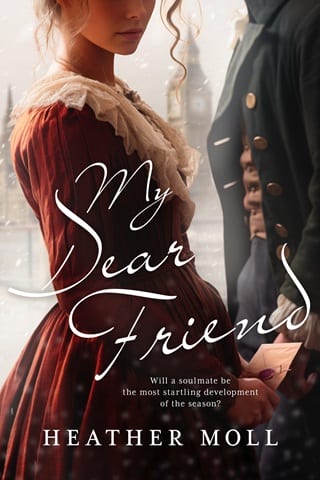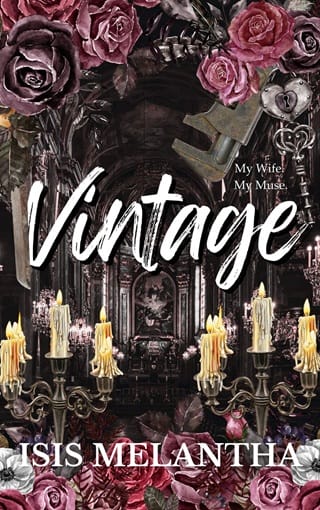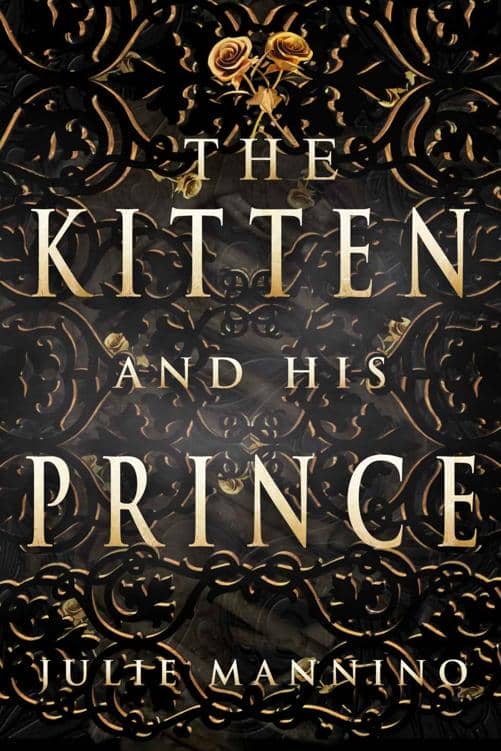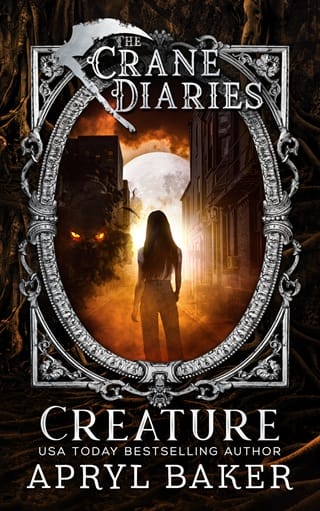Chapter 2
Chapter Two
T he office in Bishopsgate Street was in the City—within the gate and nearly in the shadow of St Helen's—before it became Gracechurch Street. The ward was filled with warehouses, inns, courts, and merchants, and near to number five there appeared also to be a ready-made linen warehouse, a stationer, and a shipping and insurance broker.
"Look, I can select a bride and then cross the street to the stationer," Fitzwilliam said cheerfully when the hackney driver stopped. "I will need plenty of paper for all the ladies I plan to write to."
Darcy watched the steady stream of passers-by and watched a man enter number five. He had the look of a clerk or a merchant. "Are you certain this is wise?"
His cousin threw him a dark look. "Give me your description. Go home, and I will subscribe you so you cannot change your mind. That is a respectable business, and you agreed to conduct this business."
Darcy saw the truth in it, however nervous he now felt about the scheme. He drew out a small envelope with his description. "Just place me in the first tier and be done with it."
"Against people from trade?" he teased. "Too high and too conceited for the second class?"
"Not at all," Darcy said, drawing back. "Bingley is from trade, and he is one of my closest friends."
Fitzwilliam's eyes brightened. "Why not marry Miss Bingley and save yourself a few quires of paper writing to a stranger?"
"You are not nearly as funny as you think you are." His cousin laughed anyway. "You saw the example descriptions: an independent gentleman, with ten thousand a year and passably handsome, would be in the first tier."
"True, but a lady who puts herself in a lower tier would not act as superior as Miss Bingley, and she with her superciliousness, twenty thousand pounds, and titled connexions would put herself in the first," Fitzwilliam reasoned. "A lady who puts herself in the second would not expect to make a grand match—although, of course, you are one," he added with a solemn mock bow.
Darcy was more troubled by a woman without an intelligent thought in her head than someone earnestly expecting a fine match. A stupid lady would make letter writing tedious and prove the entire enterprise a waste of time. "Would you do the same?" he asked, doubting the affirmative. "You are an earl's son; you would put yourself in the first tier, so do the same with me."
"I think I would find a better match in the second, but does it even matter? You are certain you won't find a bride."
"Would you please just take care of this for me?" he cried. "Please," Darcy added quietly, as an apology. "I am already wavering."
"Very well. I will take care of you."
The way he heavily said "take care" would have made Darcy afraid had he not written his own description. He handed over the envelope, and to his surprise, Fitzwilliam opened it to read, and immediately shook his head.
"This makes you sound dull, Darcy. You might as well have said you have an unyielding temper, you hate strangers and dancing, and you prefer to stay at home."
"That would also be true, but I thought it best not to lead with my worst traits."
"Let me make a few changes?—"
"Leave it!"
Fitzwilliam realised he had pushed too far and left for the office. Darcy sat back with a sigh, wondering if this was a mistake. The people going in and out of that building were willingly opening themselves up to marriage, either out of desperation or a sincere desire for companionship. Whereas he was only somewhat curious if this matchmaking enterprise was feasible.
And he was curious if a short correspondence with another woman could help him forget Elizabeth Bennet.
Fitzwilliam arrived at Darcy's house in Charles Street later that night while he dressed for an evening out.
"Here are our lists," he said as he entered Darcy's chamber. "They arrived in the four o'clock post."
Darcy started. "So soon?"
"This is the latest list, although you are welcome to submit weekly for an updated list of your class. It is rather short since the enterprise has only been a fortnight in operation. I understand there are currently more men than women."
"How does it work?" he asked while tying his cravat.
"I guess you should have come in with me," Fitzwilliam said with a teasing look out of the side of his eye. "You pay a subscription fee to access the list, select the ladies you want to write to, and if any have likewise chosen you, the office arranges your correspondence. You are identified by number, and all letters go through the office in Bishopsgate. They release the names and directions only on mutual consent granted in person."
"And is there a finder's fee upon a marriage?" Darcy asked drily.
"One per cent of the bride's dowry, or fifty pounds."
"Truly?" he cried, turning from the mirror. "I was joking." Fitzwilliam shrugged and set them down. "Do not put it aside. We may as well begin."
"You want to choose now?" His cousin sounded surprised, but he picked up the sheets. "In the carriage this morning, you seemed ready to run back to Berkeley Square."
Darcy felt his cheeks warm. "But I subscribed. It is done, and now I had best get on with it." He had agreed to do this, and it was always best not to leave a task for later that could be done immediately. A duty, even a disagreeable one, ought not to be put off. And he thought about Elizabeth nearly as often as he breathed. A distraction was necessary. "Let me select a woman to write to. It shall not take long."
"I will read as you get ready. Where are you going, anyway?"
"Dinner with my sister, and then a musical evening," he said while choosing a waistcoat. "It is a compromise because she does not want to join me and Bingley and his sisters at the panorama, but I thought she ought to mix a little more this season."
"Her reluctance has more to do with the company than the panorama itself. You know how Georgiana struggles with Miss Bingley." Fitzwilliam shook the paper straight and theatrically cleared his throat. "‘I am nineteen, genteel figure, mild manners, income limited.'"
Darcy shook his head. "She won't have any conversation."
"How do you know?" his cousin cried. "Mild manners could mean she is demure and polite."
"Her description was nine words."
Fitzwilliam acquiesced. "Next is, ‘I am twenty-seven years of age, a widow, of a large family, full-made and tall, worth four thousand, enjoy poetry and plays.' Large family?" He pulled a concerned face.
"As in many brothers and sisters, or in her brood of fatherless children?"
"I say no on your behalf. Let us move on. What about, ‘I am a young lady in the county of Surrey, worth one thousand, fair hair and small, very affectionate, active spirit, fond of conversation and cards.' Fond of conversation would be good for you."
The lady from Surrey sounded as if she wanted late parties with friends every night. "If she has to say ‘fond of conversation,' she has been told she talks too much."
His cousin swore. "You only look at women to find a blemish! Not enough talking, too much talking." While Darcy put on his coat, Fitzwilliam read down the page. "What about, ‘I am thirty years of age, widowed and no children, father was in banking, fair hair and complexion, well-tempered and sociable, enjoy riding, worth fifteen thousand pounds.' It is not every day you find a woman with a heart for riding."
Fitzwilliam's approving tone stopped Darcy while he fastened his coat buttons. If his cousin was interested, he could not select this woman even if he had wanted to. "This is the first tier of ladies, is it not? Their dowries and incomes are not as high as I would have thought, aside from this woman."
"Are you marrying for money?" his cousin asked after a pause.
"No!" He abhorred being pursued for his fortune and income; he would never allow that to be what drew him to a woman. "I was only surprised that most of the ladies in this first tier have small dowries. What about you? You need to marry with attention to money."
"My per diem in the Foot Guards is two pounds a day, thank you. I can well afford a wife." Darcy held his gaze, and Fitzwilliam looked away. His father supplemented his income, but his brother would not continue the practice after he inherited. "Yes, it would be helpful if she had her own money," he muttered.
"I suppose it would help if she was handsome also?" Darcy said, to lighten his mood. "Or enjoyed riding?"
"Always." Fitzwilliam grinned.
If there were few women of means subscribing to this curious scheme, he ought to let his cousin write to those ones. Besides, it was not as though he was actually going to meet any of these ladies. "I am uncertain about the banker's daughter. I will pass. Read on."
"I am twenty years of age, of middle stature, tolerably pretty, lively disposition, fond of books and the country, with one thousand on the death of my parents."
Darcy reflected for a long moment. Lively meant her correspondence might be engaging. Fond of books might mean she was well-educated. Fond of the country might mean a gentleman's daughter, although he was a spendthrift if she had only a thousand pounds after he died.
For the first time, he felt a small amount of excitement about the enterprise.
"Nothing?" Fitzwilliam asked. "Then what about ‘I am of age, auburn hair, short but with?—'"
"No, the last one was suitable. I pick her."
"Are you certain? There are four others I have yet to read."
"That lady will suit the purpose." A diversion from lingering thoughts about a different lively woman was all he needed. "Leave me that lady's number, and I will write to the office to see if she will correspond with me. The rest of the lovely spinsters I leave to your witty correspondence."
Elizabeth sat at the table in the drawing room with Jane, the papers from the matchmaking office spread between them. Her uncle had gone to the office in Bishopsgate yesterday, and in this morning's two-penny post came the list of eligible gentlemen. There were two sheets full of descriptions to read through. Her aunt, who pretended to have no interest in the enterprise, sat nearby with her work. Elizabeth suspected she was attending to their every word.
She stared at the sheets but hesitated to read them. What had seemed an amusing diversion a few days ago was now a reality. These men were considering marriage. Even if she was not ready to commit, if she wrote to a gentleman, she would have to do it with the honest intention of getting to know him.
"You do not have to write to anyone, you know," Jane said, patting her hand when Elizabeth still had not begun.
It was natural to feel some nerves, after all. And to be anxious was not entirely bad. One could feel anxious before something exciting just as much as they might feel anxious before something alarming. But if she was to hint to Jane that there were charming and respectable men in London who were open to marriage, men more faithful than Bingley, she would have to prove it so by writing to one.
"Of course I do," she said cheerily. "I am eager for the endeavour to begin, and you must help me choose—unless you see one for yourself."
Jane smiled. "I leave all the bachelors to you."
Elizabeth scanned the list, looking at the incomes down the page. "I put myself in the second tier, but with my lack of fortune, I could have been in the third."
"You are a gentleman's daughter, my dear," her aunt said. "For that reason, you ought to be in the first."
"My worth is fifty pounds a year," Elizabeth said flatly, "and that is only after both of my parents are dead. I think I am fortunate to have a claim to the second class."
"A worthy man would not care at all about that," said Jane.
"Wickham did," Elizabeth mumbled. "And he was a worthy man."
"Was he truly?" her aunt asked, her fancy work forgotten in her lap. "It would have been an imprudent match, as I told you at Christmas. He ought not to have encouraged your interest, knowing he could never support you. And then," she went on when Elizabeth opened her mouth, "as your mother wrote, he turned to that young lady and her ten thousand pounds."
"Perhaps he is not the best of men, but he is not hatefully mercenary." A man needed something to live on, just like the gentlemen who subscribed to this institution. Anyone who wrote to her would know how limited her fortune was. "You admitted Wickham was a most interesting young man, and he is from Derbyshire, so you cannot think too ill of him."
Mrs Gardiner smiled and took up her work, gesturing to the table with it. "You and Jane focus on the task at hand. Choose wisely."
Elizabeth smiled as she read the first description. "‘I am forty years of age, stout and tall, well-tempered, have a situation in the Excise of four hundred per annum and a small estate of the annual value of one hundred.'"
She turned to Jane and silently asked her opinion. "Five hundred a year is a decent competence," Jane said cautiously, "and perhaps the estate could be improved. And if he works in the Excise, you would live in town."
"Forty is rather old for me, is it not?" Elizabeth frowned. "My father is forty-seven."
Jane agreed and read the next one. "‘I am thirty-three years of age, a widower with an estate in Sussex valued at two thousand. I am of a healthy constitution, sociable.' Oh, he is younger, and sociable would be perfect for you."
"He wants you to raise his children," Mrs Gardiner muttered, not looking up from her work.
It was wise to have her aunt's input. Her advice was always worth listening to. "Thank you for helping. I know you do not approve of the arrangement."
Her aunt shook her head. "Your uncle has convinced me the endeavour is private and respectable. I am just afraid of your being disappointed, or misled."
Elizabeth was in no danger of having her heart broken. She only wanted to show Jane that there were kind and loyal marriage-minded young men in the world so she could forget Bingley. She had no real expectations for herself. The gentleman she wrote to would have to be delightful for her to agree to meet him.
Elizabeth picked up the second sheet. "What about this one? ‘I am thirty years of age, have a situation in the Foot Guards, am well-tempered, lively, fond of travelling and home.'"
"He sounds lovely, Lizzy," said Jane. "You should pick him."
Elizabeth frowned. "He does, but he would have to choose me, too. This soldier might not be able to afford to marry a woman with no money of her own."
"Oh, hear this one," Jane said, reading from her sheet. "‘A young gentleman, tall and slender, dark hair and eyes. I have an estate without debt or drawback; well-educated, of domestic habits, fond of books and the country.' He used the same phrase you did. You have something in common."
Elizabeth took the sheet to look for herself. She had also written "fond of books and the country." Her heart beat a little faster at the idea of matching with someone. She was curious about him, but it was too soon to become eager.
"He sounds interesting, but he does not say his income. What could he mean by that?" There was no point in writing to a gentleman who could not afford to marry a woman like her or Jane.
Jane shrugged, but her aunt said, "He means he has an estate and can support a wife, and does not want a horde of ladies writing to him because of his income. That is what you want," she said, pointing, "a responsible young man who does not run to debt."
"That is true, but let us read through them all. What about, ‘I am twenty-four years of age and about to be a barrister, middle stature, active and rather agreeable, enjoys cards.'"
"He sounds promising, Lizzy," said Jane with enthusiasm. "An agreeable barrister would be perfect for you."
"A gadabout, I am certain," said Mrs Gardiner, frowning. "He will gamble away all his income when he becomes a barrister. Aim higher than a man who does not have a proper situation. Do not undervalue yourself, and certainly not for a man like that."
Elizabeth smiled. Her aunt might as well have stood on a ship's bow and waved a red flag. "True, but they do not all mention their physical attributes, either. Should that alarm me, too?"
"Did you mention your appearance?"
"Why, yes," she said, giving a sly look to Jane. "I said I was tolerably pretty."
Her aunt gave her a surprised look. "But you are a very striking girl."
She shook her head. "You are family and biased in my favour. My being scarcely acceptable as pretty is a verifiable fact. Mr Darcy once announced my tolerableness to an entire ballroom. No, I cannot claim a fortune, and I had best not over-promise on my beauty either."
Mrs Gardiner laughed. "Do not worry so much about their appearances, then," her aunt said. "You and your sister read through the rest and make your choice."
She and Jane read every description. Jane found something favourable about every single one, but Elizabeth was more discerning. Some sounded dull, some gave not enough information to make it worth their being her sole correspondent. Others were too old, or could not afford to marry her, or her aunt found an implication that alarmed her.
"You know, if none of these men suit, nothing says you must write to anyone," said Jane when they were done. "Or wait a week and see if a new subscriber appeals to you."
Elizabeth turned back to the first page. Something about the tall, dark-eyed young man had struck her. He was a responsible estate owner, who could talk of books, was not as old as her father, and cleverly phrased his description to give enough away to someone paying attention.
Mrs Gardiner came near. "Did you choose one, my dear?"
"Yes," she said firmly, pointing to the description. "I will ask my uncle to arrange it, and I will show you all that it is a reputable enterprise that can unite like-minded people." Elizabeth's enthusiasm fell. "Although if this young man does not also choose to write to me, I must select another one."
"Every man who reads the list would choose you," said Jane, putting an arm around her.
"You forget my history with young men as of late." Elizabeth smiled sadly. "Wickham did not because he could not afford to, and Mr Collins only did because I was present, not for my good qualities." Her sister and aunt were giving her sympathetic looks, so she added brightly, "And Mr Darcy never would choose me because I am only tolerably pretty."
Mrs Gardiner squeezed her shoulder. "Well, this tall young man with an estate and an interest in books and the country seems a sensible one, so of course he will want to write to you."
 Fullepub
Fullepub 



